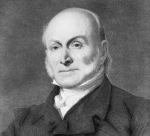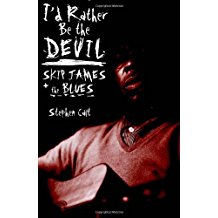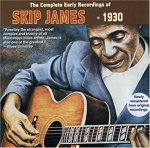A Review of
 Stephen Calt, I’d Rather Be the Devil: Skip James + the Blues. Chicago: Chicago Review Press, 2008.
Stephen Calt, I’d Rather Be the Devil: Skip James + the Blues. Chicago: Chicago Review Press, 2008.
His music was the defiant product of an emotional hermit: “I wanted it different all the way—I always have had that intensity, to go contrary to the rest.” (p.19)
* * * * *
Nehemiah Curtis “Skip” James was born on June 21, 1902, on the Whitehead plantation, near Bentonia, Mississippi. His mother, Phyllis, was cook and babysitter for the Whitehead family; his father, Eddie, was a guitarist and bootlegger. Described by Calt as a “local lowlife,” (25) Eddie James fled the area about 1907, abandoning his family and creating in young Skip “daddy issues” that would dog him for most of his life.
James became a self-taught guitarist, using an instrument purchased for him by his mother. Hoping to sound forlorn, he also adopted his distinctive falsetto early on. Baptized in his early teens into his mother’s fundamentalist denomination, Skip didn’t let his religious bent interfere with either his way of living or his blues playing, though it would trouble him later. Her son’s flirtation with “the Devil’s music” did not seem to upset Phyllis James, for she arranged for him to take piano lessons from a cousin.
Evidently, young James hoped to use his musical skills to earn enough money to become a pimp, and he largely succeeded. This, um, skill, along with bootlegging, would allow him to survive the Depression without any real need to earn big bucks as a bluesman. Skip dropped out of school and left Bentonia in 1919, working as a laborer, gambler, and pimp, and revealing a violent disposition when challenged in any of these endeavors.
Five years later, when Prohibition shut down “barrelhouses” and “juke joints,” reducing opportunities for blues players, not to mention pimps, James returned to Bentonia, where he acquired a bootlegging “franchise” from Kirk Whitehead, owner of the plantation on which Skip had been born and grown up. James claimed that he could make $60-$70 a week as a bootlegger, and enjoy Whitehead’s protection from revenue agents, so playing the blues became merely a sideline.
During the 1920s, James honed his skills as a piano player, and, whether performing on the guitar or the piano, his instrumental skills were more of a draw than the songs he wrote, sang, and played. In the late ‘20s, James married a clergyman’s daughter, Oscella Robinson, who helped organize “house frolics” in Bentonia where Skip not only performed but also peddled his bootleg whiskey. This marriage was short-lived—Oscella abandoned Skip, dealing his ego a blow, helping to convince him that women were untrustworthy.
* * * * *
Perhaps trying to stoke his bruised self-esteem, Skip James drifted reluctantly into making records. A talent scout, H.C. Speir, was so impressed that he arranged a recording session in 1931 with Paramount Records in Grafton, Wisconsin. James’ reputation as a blues singer would rest on the eighteen tunes he recorded there.
The timing of James’ Grafton sides could not have been worse: the Depression was in full swing, and Paramount was on its last legs. Consequently, few copies of James’ 1931 sides were sold, and he would not record again for more than three decades. His biographer contends, though, that even without the Depression Skip was doomed to fail as a blues player. He was not much of a “performer,” and the songs he sang revealed an alienated, tortured soul with few friends and fewer prospects, the “emotional hermit” referred to above.
Surely the best known of the eighteen tunes that emerged from the Grafton session was Devil Got My Woman, one in a long line of blues songs featuring satanic imagery and thus reinforcing the belief held by many religious African Americans that the blues was “the Devil’s music.” To Stephen Calt, James was ambivalent on that issue: he regarded “satanic possession” as “little more than a figure of speech,” (111) yet “considered the blues the product of Satan.” (118)
* * * * *
Shortly after Skip returned from Grafton, his father came back into his life, after twenty years. Now a peripatetic minister, Eddie James asked his son to join him in his religious mission. Skip finally agreed to abandon the blues, for “a patron, a protector, and a father” (167), yet his “religious conversion” was neither sudden nor complete.
The younger James might have surrendered his guitar, played piano for his dad’s church, even organized a short-lived gospel group, but he continued his battle with Demon Rum, played pool, and accepted financial support from a local prostitute. In 1936, when Eddie moved to Birmingham, his son returned to the Whitehead plantation, bootlegging, and the blues. A year later, though, Skip rejoined his father in Selma, becoming for a few more years a “kept man” in Eddie’s seminary before the two drifted apart again. (204)
Skip James was finally ordained to the ministry, but wanderlust once more overtook him and he abandoned religion. After marrying his second wife, Mabel, a cook in a labor camp, James traveled around Mississippi doing farm work. In the early 1950s, he joined a cousin working land on a plantation, but that venture died when James ran out on his partner and returned to the blues, performing on piano and acoustic guitar.
While James was acting out his Hamlet-like “God or the Blues” drama, disparate groups, composed mainly of whites, rediscovered “old-fashioned music,” including folk songs and the blues, though of the acoustic variety, not the electrified version associated with post-World War II Chicago. Moreover, by the early 1960s, a few young white blues fans were prowling the South attempting to locate survivors of the early “race record” era that had died in the Depression. Two notable “rediscoveries” by these long-haired “talent scouts” were Son House and Bukka White.
The trio that had found Bukka White also located Skip James, in a Tunica, Mississippi, hospital, where he was being treated for cancer. James initially did not trust these emissaries from the “Blues Revival of the 1960s,” who were mainly interested in making money off what remained of his talent. As had been the case three decades earlier when his father re-entered his life, though, Skip eventually gave in, and he soon was on his way to the Newport Folk Festival.
* * * * *
It was at Newport in July 1964 that Skip James met an eighteen-year old blues groupie, Stephen Calt. He agreed to allow Calt to interview him at length and record his thoughts; these tapes ultimately became the primary source for this biography. Sounds like serendipity, right? Not according to Calt, who writes, “Had I known how our lives would intersect over the next four years, I would not have initiated that first conversation.” (265)
James’ medical issues did not disappear with his re-emergence on the blues stage. By early 1965, a cancerous tumor on his penis led to castration. (Skip characteristically attributed the cancer to a former girlfriend.) James also used his “rediscovery” as a blues man to abandon his wife Mabel and move to Philadelphia, where he took up with a widow named Lorenzo Meeks, a fervent member of the “sanctified church.”
James’ amateurish managers were unable to guide him to the promised pot of gold at the end of the “blues revival” rainbow, so he sought new, more professional help, but without much luck. Skip sold the rights to his songs to a new manager’s company, but the album produced under his direction sold few copies. His next manager secured a two-record deal with Vanguard for him, but those albums also did poorly. James was unhappy with both the money he made and the underwhelming reception he received from the largely white crowds in coffeehouses. He asked young Stephen Calt for help, and Calt arranged a few gigs for the blues man on more receptive college campuses.
The “folk blues” movement succumbed to rock ‘n’ roll in the late 1960s, with much of the damage done by hirsute rock “guitar heroes” who appropriated songs and guitar techniques from the old blues guys without compensation. Fortunately, Eric Clapton and Cream brought James a financial windfall, crediting him as composer of “I’m So Glad” when they covered that tune on their million-selling album Fresh Cream. Even so, Skip, like his rediscovered contemporaries, still struggled financially, which placed a strain on his relationship with his wife. Calt even claims that James spoke to him of making a new will leaving his estate (what there was of it) to Calt and his sister.
Skip’s guitar skills atrophied because he disliked practicing and increasingly withdrew into a shell of cold self-interest. Then, in late October 1968, he was readmitted to the hospital, diagnosed with inoperable cancer, and sent home to die. James interpreted this latest setback as divine punishment, and he vowed that, if God saved him, he would play only spirituals thereafter. Skip James died on October 3, 1969, his passing receiving little notice, his funeral sparsely attended. Stephen Calt came, of course, and offered James’ cousin a shot at interpreting the arc of Skip’s career: “He woulda been better, but see, what messed him up was—people tried to shame him outta singing the blues.” (351)
* * * * *
This work lacks both notes and bibliography. Calt relies heavily on five years of taped interviews with James, supplemented by a few with other blues men, either by the author himself or by researchers Gayle Wardlow and Edd Hurt. Calt also insists that what he collected from James were “discourses” rather than interviews, because Skip enjoyed rambling and did not like interruptions. Like many white fans who interviewed old blues performers in the 1960s, Calt doesn’t always assess the plausibility of his subject’s assertions, and his heavy reliance on a single acknowledged source occasionally magnifies the weakness of this approach. Moreover, that Calt himself becomes a “character” in the book while recounting the last five years of Skip’s life also can be problematic.
Every now and then, Calt inserts a chapter that sketches in the larger context of blues history, but again the lack of a bibliography makes it difficult for the reader to evaluate some of the generalizations offered by the opinionated biographer. For example, he denigrates the Chicago blues as essentially “easy listening” music, “studio blues” cranked out by a series of “facile lyricists.” (199-200) He also dislikes the “country blues” label often attached to unaccompanied, acoustic guitar performers like James, denying that there were any significant geographical differences in blues “styles” growing out of performers’ places of origin. (217-223)
Likewise, Mr. Calt rejects the notion that Muddy Waters’ and Howlin’ Wolf’s hits on Chicago’s Chess label in the early 1950s sparked a revival of “down-home blues,” arguing that other record companies didn’t rush to emulate Chess, and that only “payola” to disc jockeys accounted for their success. (227)
Calt also emphasizes how small the community of “hard-core blues enthusiasts” was in the early 1960s; to him, the “Blues Revival” was largely the creation of mass-market and blues specialty magazines. He argues, correctly I think, that the term “revival” was relative—at its peak, the blues had about 1% of a mostly white music market, because African American music fans had moved on to rhythm and blues or rock. As he writes tartly, “The blues ‘revival’ of the 1960s actually represented the placement of blues upon a white respirator.” (249)
James’ biographer is not a fan of ‘60s “folk music” either, describing it as “characterized by a pretentious loftiness, consisting largely of an affectation of purity.” (256) Maybe, but thanks to the “folk movement,” old bluesmen like James had a chance for a “second act” in their careers.
In short, although Mr. Calt might have intended to produce a “warts and all” biography of Skip James, his emphasis seems to be mostly on the “warts”; the “all” is harder for the reader to discover.
* * * * * *
For those interested in reading more of my reflections on history, here are links to my books on the subject:
 Rancorous Enmities and Blind Partialities: Parties and Factions in Georgia, 1807-1845 (University Press of America, 2015)
Rancorous Enmities and Blind Partialities: Parties and Factions in Georgia, 1807-1845 (University Press of America, 2015)
In Pursuit of Dead Georgians: One Historian’s Excursions into the History of His Adopted State (iUniverse, 2015)





This is great George- thank you!
Sent from my iPad
>
Thanks, Don! Glad you like it.
Always so good to read your blogs and to keep in touch! Happy holiday weekend!!!
Love, Merrilyn
Thanks very much, Merrilyn, and a happy Labor Day weekend to you and yours as well!
I appreciate this comment, Mr. Warshak. I recognize the names of most of the folks you mention who helped bring about the “Blues Revival” while aiding surviving “Blues men.” Unfortunately, Blues “purists” tend to portray those who “re-discovered” surviving “Blues men” as “exploiters,” an argument I have not found particularly persuasive. So, thanks!